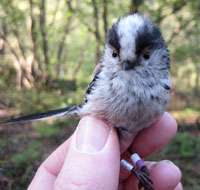Long-tailed tits set for climate boost

Long-tailed tits will be an unlikely beneficiary of climate change, according to new research.
The 20-year study says warmer spring temperatures will make life a little easier for the birds as they fight to feed their chicks through those critical first few weeks of life.
Until now, it was thought that the fate of the tits would be decided in the battle to survive the cold conditions of winter. But PhD student Pippa Gullett, and her team at the University of Sheffield, say it's spring and autumn weather that holds the key.
'During spring, birds work their socks off to raise their chicks,' says Gullett. 'For most small birds that live for only two or three years, not raising any chicks one year is a disaster. They might only get one more chance, so they can't afford to fail.'
As a result, the birds are willing to risk everything for their young, even death.
'If it's cold and wet in spring, their job becomes much tougher – food is harder to find, and eggs and chicks are at risk of getting cold. By the end of the breeding season, the adult birds are exhausted.'
This leaves them vulnerable in the seasons ahead, and birds breeding in cold and wet springs have much less chance of surviving to the following year.

But it seems to be autumn, rather than winter, that does the damage. While the colder winters of recent years had no real effect on adult tit survival, chilly and wet autumns were associated with a rise in death rates.
'We're not saying that birds never die in winter – in harsh years there are bound to be some fatalities,' explains Dr Karl Evans, who supervised the research.
'But it seems that in most years autumn weather plays a bigger role, perhaps acting as a filter that weeds out weaker birds before the real winter hits.'
The latest climate projections hint at wetter autumns in the coming years, but any rise in long-tailed tit mortality as a result is likely to be offset by gains due to the warmer and drier springs.
'Looking ahead to the future, our data suggest that every single plausible climate change scenario will lead to a further increase in long-tailed tit survival rates,' adds Evans.
'While many species struggle to adjust to climate change, these delightful birds seem likely to be winners.'
Last year, a report by the Living With Environmental Change Partnership said that warmer temperatures are already forcing many British species to retreat northwards and to higher ground.
It also warned that climate change may be making it easier for species from foreign shores to establish themselves in Britain, often to the cost of native wildlife.
More information: Gullett P, Evans KL, Robinson RA and Hatchwell BJ, 'Climate change and annual survival in a temperate passerine: partitioning seasonal effects and predicting future patterns' Oikos, 2014 DOI: 10.1111/j.1600-0706.2013.00620.x
Journal information: Oikos
Provided by PlanetEarth Online
This story is republished courtesy of Planet Earth online, a free, companion website to the award-winning magazine Planet Earth published and funded by the Natural Environment Research Council (NERC).




















